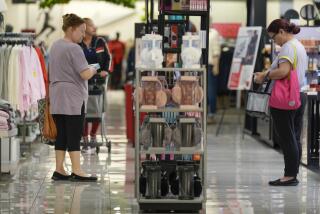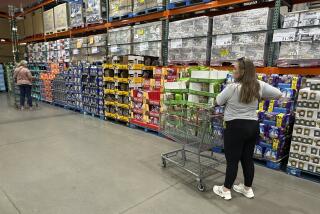Soaring energy costs fuel retail sales
WASHINGTON — Soaring energy costs helped fuel a record jump in wholesale inflation and an unexpectedly strong gain in retail sales, government reports showed Thursday, sending mixed signals about the state of the economy.
The figures come as consumers struggle to get a fix on their financial future and economists scrutinize statistics, searching for signs of recession or resiliency. The latest economic data hinted at a bit of both.
On the gloomy side, wholesale prices leaped 3.2% in November, the second-highest monthly gain in the producer price index since the energy crisis of the 1970s, raising fears that high energy costs could be igniting inflation throughout the economy.
On a brighter note, consumer spending, which accounts for about 70% of the economy, rose 1.2% last month, about twice what economists had forecast. Roughly half of that increase was caused by rising fuel prices, but analysts noted that the rest of the gains appeared to be spread across other retail sectors -- suggesting that consumer spending would buoy economic growth in what many had feared would be a dismal fourth quarter.
Economists said the results showed that high energy prices were beginning to have a real effect on the economy. But they also cautioned against drawing conclusions based on either the Labor Department’s producer price index or the Commerce Department’s retail sales data.
“If you believe the retail sales number, you’d think we’re in the midst of a boom. If you believe the [producer price index], you would think there’s runaway, rapid inflation. I think neither one is accurate,” said Joel Naroff, president of Naroff Economic Advisors, an economic forecasting firm in Holland, Pa.
The link between producer and consumer prices is neither quick nor direct, and the effect of a short-term jump in energy prices at the wholesale level could be minimal, Naroff said.
“Clearly energy costs are killing people,” he said. “But as a broad-based indicator of inflation, that’s just not there.”
Yadira Vargas is among those feeling the squeeze of higher prices.
Vargas, 21, said the rising cost of fuel and groceries meant she couldn’t buy new shoes for her 3-year-old son, Efrain. She quit her studies in medical office management a few months ago because she could no longer afford the tuition.
“It makes me want to leave here and go to another state or country,” Vargas said as she eyed discount price tags at a Ralphs supermarket near her home in downtown Los Angeles.
Still, many economy watchers have been surprised by the relatively modest ripple effect of sharply higher oil prices, which approached $100 a barrel last month.
On Thursday, the cost of light, sweet crude for January delivery fell $2.14 to $92.25 a barrel -- almost $34 higher than at the beginning of 2007.
The run-up in oil prices boosted the cost of gasoline and diesel to unusual heights for this time of year. The nationwide average price of self-serve regular was $2.985 a gallon Thursday, 30% higher than a year earlier.
Diesel prices, up 20% since August, are of particular concern because diesel-fueled engines carry most of the nation’s goods to market, including food, cars and popular holiday gifts such as toys and electronics.
“It’s surprising that we have not seen more of it in all the data,” energy economist James Williams said.
“Higher diesel costs means my head of lettuce is going to cost more to come from California to Arkansas,” said Williams, who is based in London, Ark. “Eventually the prices have to get passed on, and that’s what we’re starting to see in the producer price index.”
Williams sees a 50% chance of recession in the United States. If the economy skids, he believes that energy prices will tumble.
Others think high oil prices could stick for a while, ratcheting up the cost to consumers -- and to the economy.
“If crude prices stay where they are, we’ll probably get another 25 to 50 cents a gallon” increase at the pump, said Philip K. Verleger Jr., an energy consultant based in Aspen, Colo. “So it’s not over.”
That’s a sobering thought for Natalie Alderete, a 30-year-old single mother who was taken aback by the $3.49-a-gallon price for regular gasoline posted at a 76 station in downtown Los Angeles.
“This is a scary price for me,” Alderete said as she pumped $5 worth of gas Thursday -- enough to get her home to La Puente, where fuel prices were cheaper. Her gasoline bills have nearly doubled and are straining an already tight budget, she said.
Ken Matheny, senior economist at Macroeconomic Advisers in St. Louis, said the jump in producer prices, although attention-getting, was not necessarily bad news. He’s looking to November’s consumer price index, due to be released today.
“The far more important report will be the CPI, but I don’t expect to see a big surge outside of the more volatile food and energy elements,” Matheny said.
Peter Kretzmer, a senior economist at Bank of America Corp., said the retail sales jump was significant.
“What are people doing about high energy costs? They are still spending,” Kretzmer said. “This month, gasoline prices soared yet people not only paid for gasoline but also went to the stores.”
That bodes well for economic growth, which many people have been predicting would stagnate this quarter, said Ken Beauchemin, a director at Global Insight, a Washington-based economic forecasting company. He pointed to the 1.9% increase in retail sales, minus spending on food and fuel.
“That’s a pretty strong number, and it implies a stronger likelihood that consumer spending will stay strong,” Beauchemin said.
Naroff, however, noted that in anticipation of a dismal holiday retail season, many retailers began discounting early and may have drawn more shoppers into their stores sooner. In addition, with Thanksgiving falling earlier than usual, November included an extra week of holiday shopping.
“There’s a real serious question whether it will be sustained,” Naroff said.
elizabeth.douglass
@latimes.com
Reynolds reported from Washington, and Douglass and Kim reported from Los Angeles.
More to Read
Inside the business of entertainment
The Wide Shot brings you news, analysis and insights on everything from streaming wars to production — and what it all means for the future.
You may occasionally receive promotional content from the Los Angeles Times.











